Shieldon and Eric Garza’s Process in Making the Blacksmith Viper EG01A Knife
As professional knife users and manufacturers, Shieldon and Eric Garza understand the importance of having a quality knife.
Knife users need knives that can handle any situation, while knife manufacturers need knives that can be put through rigorous testing without fail.
That is why they have teamed up to create the Blacksmith Viper EG01A knife.
This knife is made of high-quality materials and has been tested extensively to ensure that it is perfect for any purpose.
The Blacksmith Viper EG01A is an excellent choice for anyone looking for a reliable, durable knife.
Our team of experts worked hard to come up with a knife that is useful and fashionable at the same time.
In this article, we will meticulously discuss the step-by-step process of creating the Blacksmith Viper EG01A Knife.
Proposal of the initial model
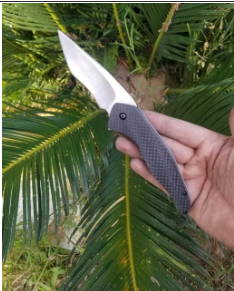
The audience showed a great deal of enthusiasm for an existing model that Eric showcased at the presentation. This model received a lot of positive feedback overall.
In the past, Eric was well-known for his skill in hand-crafting his own designs. He is an active participant in a huge knife community, and one of the regular activities that the group participates in is the trading of hand-crafted knives and other equipment.
Despite the fact that Eric has shown this model in the past, he was unable to track down a knife manufacturer in order to get it produced in large quantities for commercial sale.
Kizer and Kansept made some inquiries into the possibility of a royalty project model before Shieldon made contact with Eric.
In spite of this, Shieldon was extremely fortunate to acquire this model, which is often referred to as the Viper. And it was ultimately the Viper that served as Shieldon and Eric's introduction to working together when they first began using a model.
Verification of the measurements and specifications of the first model
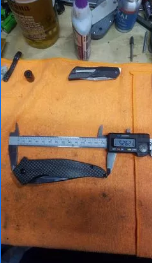
Although he struggled with computer-aided design (CAD), Eric revealed in the manual processes of drawing and making.
He showed us some photos of the hand-built Viper and asked us to draw it to scale from them.
Our experts checked the dimensions, calculated the volume, and guessed at the composition on the inside.
Although Shieldon produces EDC folding knives for tactical use, the original Viper was far too big to be a viable EDC. So, we asked Eric whether there was any way to make it smaller for easier transport.
We got Eric's stamp of approval, and then our experts got to work shrinking it down to match the Shieldon model.
The group was not planning any drastic reductions. Our experts always produce blades that are indistinguishable from authentic ones.
Creation of the knife prototype
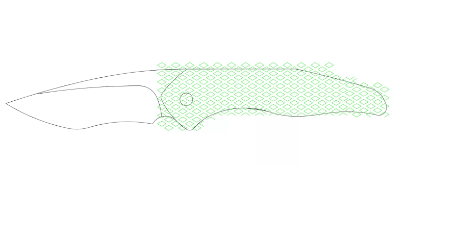
The photos unequivocally illustrate that our qualified experts were easily able to develop the visual layout.
The technology that was necessary to produce this knife was not very complicated.
The sharpened blade and cutting edge are what ultimately make or break the deal for the customer. It does not go in a straight line but rather curves about here and there.
Resizing of the knife design
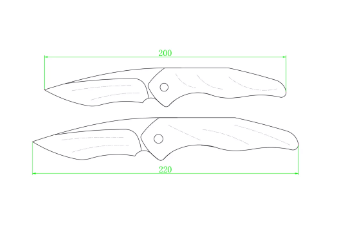
Our crew cut the overall length of the royalty model down from 220 millimeters to 200 millimeters, which will give in a blade length that is less than 3.5 inches long and is excellent for an everyday carry sidekick.
In point of fact, Eric had wished that the original size would be preserved, but after giving it some thought, Eric came to admire Shieldon's approach.
Because of its fashionable and well-acclaimed EDC knives, it is in a position to satisfy the requirements of the great majority of its customers.
Consideration of angles
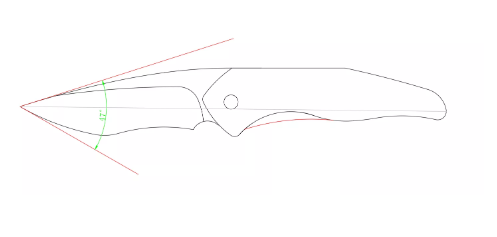
This so-called large knife has a blade angle that reaches 47 degrees, and the overall sharpness is like a seesaw; it is thin on both sides, but it is hefty in the middle.
This model brought to mind images of a snake, particularly its head. Eric has come to the conclusion that the best name for it is Viper.
Inspecting the pivot
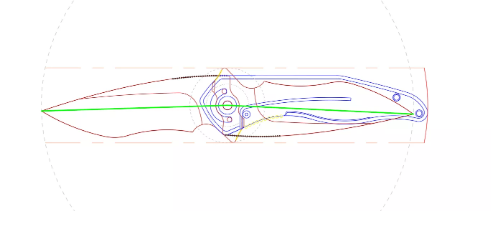
In order to ensure that the blade can rotate into the handle in the appropriate way, our specialists took considerable attention in the creation of the pivot. The only mechanism that can be opened is this one right here. This is the back of the card.
It used to be thought that the more open the mechanism was, the more popular the model would be since people could play the game in a number of different ways. This was one of the reasons why open-source software was so successful.
Finalizing the appearance
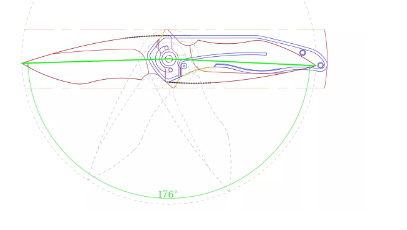
It is thought that Eric's fixed-blade knife served as the inspiration for the design of the Viper, which likewise seems to have been meant to work as a fixed blade.
When our team set out to make the entire thing seem better, one of our key objectives was to get rid of the notion that it was a survival knife.
Because of this, both the handle and the blade are made thinner, and the ricasso area and the guard are given a smoother finish.
At long last, it seems like this device might become a huge folding knife suitable for daily use.
Finishing 3D drawing
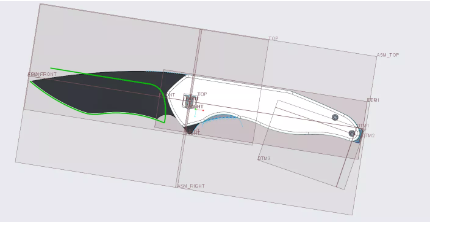
We started by building the model one step at a time, using the 3D image as a reference.
The overall structure was anticipated to be uncomplicated. Our crew built the water milling line to be as tall and heavy as humanly possible in order to make it as strong as possible.
Eric was also asked what color he wanted by our company's specialists, and he named a few options, including black, blue, orange, olive, dull green, and dessert tan. Following that, they carefully considered the hue of the initial draft.
Deciding on the color
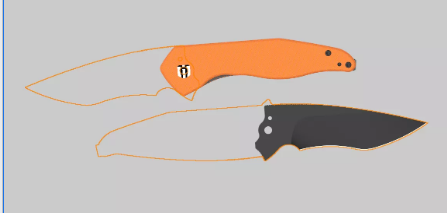
Our panel of industry professionals eventually chose Tangerine G10, a kind of orange, as the finest choice for the initial release of Viper.
According to our market research, orange-handled folding knives are the most often purchased.
The Spyderco Endura 4, the Kershaw Leek, the Cold Steel Finn Wolf, the Gerber Haul, and many more are currently available on the market.
Design inspiration
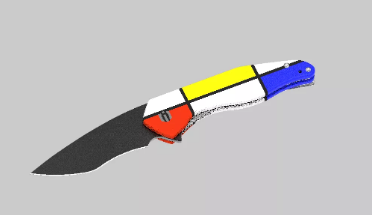
When Eric asked for the knife to be produced in as many various colors as he wanted, the first image that sprang to mind was a Piet Mondrian.
It is distinguished by the hues yellow, blue, and red. Our group intended to pay respect to the classics.
However, modern technology could not turn G10 into such a mixed color since the cost would be too high.
Viper-inspired handle
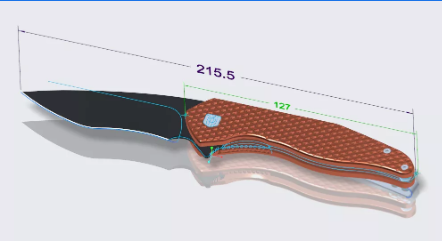
We regard the knife to be a kind of snake since its name is Viper. Because designers believe the handle to be a representation of the snake skin, experts created the handle brown and the blade black.
Designers have chosen to create a premium version of this design in the future if the tangerine version proves to be a best-seller.
The overall length is 215.5mm, which is around the length of an EDC knife. The handle is 127mm in length.
Finishing the blade design
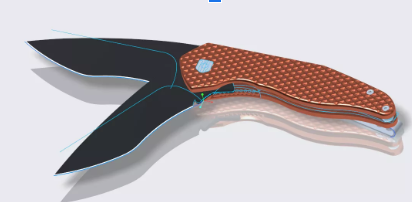
For the first time ever, designers used DLC for this blade finish.
DLC finishes are manufactured in the same manner as synthetic diamonds, by blasting carbon particles into the surface of the steel and providing a stronger and more resilient protective layer than titanium coating.
Diamond is one of the world's hardest substances.
This is the coating that most closely resembles a diamond coating, or more precisely, a diamond-like coating utilized in military grade.
Asking for Eric's feedback
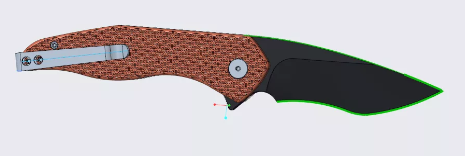
Specialists inquired as to what kind of finish Eric preferred.
DLC (diamond-like coating), which is more difficult than black titanium coating, was chosen because we want a coating that was superior to titanium.
Due to its scarcity on the market, we are certain that it causes a good commotion.
Finalization
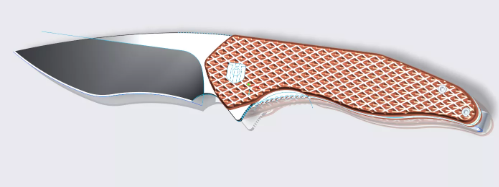
Our team is used to giving each step of the innovative and productive process more attention since we lose sight of the fact that simplicity is great while we're working.
It was necessary to maintain this discipline in mind.
3D render check
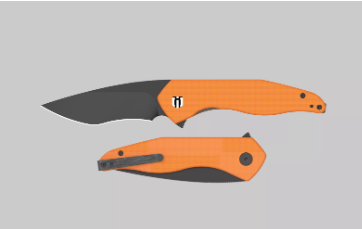
Eric approved the 3D rendering when it was done without incident. The grip is orange, with a titanium finish on the blade and a black pocket clip.
A design with an ideal pivot and wavy lines.
By looking at the full width of the blade, which is just 12mm, you can immediately understand how we were able to change a so-called fixed knife design into a conventional daily carry (EDC) folding knife.
Eric wants to see a prototype as soon as it's done. He plans to share his teaser and dialogue with the knife groups in which he is involved. He is crossing his fingers that his royalty model will be successful.
Takeaways
Shieldon provides the Blacksmith Viper EG01A knife if you are seeking for an economical and high quality knife that is guaranteed to give you the right blend of durability, elegance, and utility.
Whether you are an experienced outdoor explorer or just love camping and hiking, this knife will suit all of your EDC requirements. So, what are you holding out for?
To learn more, contact Shieldon now!

